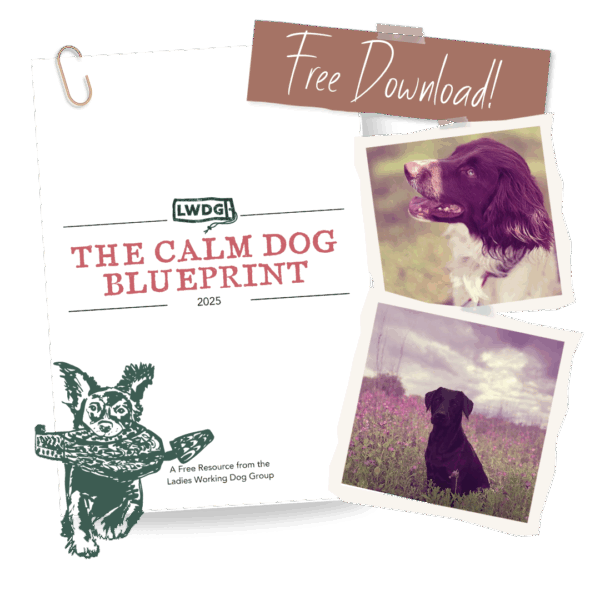🎧 Listen to this episode now
Ever stood in the middle of a field, treats ready, lead in hand, shouting yourself hoarse—while your dog blissfully ignores you?
Yep, me too.
One minute they’re your shadow, perfectly behaved and attentive. The next, they’re off chasing something you can’t even see, leaving you feeling like you’re failing at this whole training thing.
It’s easy to fall into thinking: “I must be getting it all wrong.”
But here’s something I wish someone had told me sooner:
It’s not that simple. In fact, it’s rarely even about you.
Understanding Your Dog’s Behaviour—Beyond “Good” and “Bad”
This week on the podcast, I sat down with Emma Liddell, psychotherapist, mindset coach, and someone deeply fascinated with brains—whether they belong to humans or our four-legged friends.
Emma said something that really hit home—that she’s interested in brains regardless of who they belong to, humans or dogs alike.
That’s exactly why this podcast series exists—to give you fresh ways to understand your dog’s behaviour, beyond the usual “just train harder” advice.
Introducing: The Seven Lenses of Dog Behaviour
In our first episode, Emma introduces seven lenses that help us better understand why our dogs behave the way they do:
Evolution and Domestication
Dogs are wired first and foremost to survive—not necessarily to cooperate. Even your beloved sofa-hogging pup carries survival instincts shaped over thousands of years.
Emma explained that behaviour happens for survival, meaning even if your dog appears like they’d never survive five minutes in the wild, those instincts remain strong.
Genetics
Did you know up to 40% of your dog’s behaviour could be driven by genetics? Emma herself learned this lesson with her own dog, Scout. Initially, she just saw him as a dog, overlooking his breed and underestimating the significant role genetics play in shaping behaviour.
Neurobiology and Hormones
Your dog’s “naughty” habits—like obsessively chasing birds—aren’t acts of rebellion. They’re driven by brain chemicals, particularly dopamine, which gives your dog a rewarding rush each time they engage in instinctive behaviours.
Emma pointed out that predation provides dogs with a dopamine hit. When your Spaniel fixates on a bird, they’re literally getting a dose of feel-good chemicals.
Physiology, Cognition and Emotion, Sociology and Body Language
From how your dog’s physical senses shape their world, to why dogs in different cultures behave differently, these lenses help us understand behaviour from angles we often overlook.
You’re Not Alone—and You’re Definitely Not Failing
One of the most powerful moments for me was when Emma shared her own experience of walking away in tears, unsure what to do next with her dog.
If you’ve ever felt the same way, this conversation will remind you that you’re not alone. More importantly, you’re not failing. Understanding is the first step toward real progress.
Why This Matters to You and Your Dog
Too many of us dog owners feel stuck, thinking we just need to “train harder” or “try more techniques.”
But imagine what could happen if you shifted your perspective:
“Maybe this isn’t about me getting it wrong.”
“Maybe there’s something deeper going on.”
That simple shift can remove so much pressure, helping you move forward with confidence.
Listen to the Full Episode
Dive deeper into these insights with our full conversation—it’s like having a coffee chat that might just change your relationship with your dog forever.
Share Your Story
Did this conversation resonate with you? Did you experience an “Ah-ha” moment?
Leave a comment below or tag us on social media. Your story helps others see they’re not alone either.
Because you and your dog deserve understanding—not judgement.
Tired of Feeling Lost With Your Dog’s Behaviour?
You don’t have to feel like you’re guessing your way through training. The Calm Dog Blueprint gives you clear, gentle, step-by-step guidance—so you can finally understand your dog’s actions, build a better connection, and feel confident again.
Get Your Free 'LWDG Calm Dog Blueprint'
5 simple steps to help your dog focus, reduce overexcitement, and make training feel easier — without shouting, stressing, or second-guessing yourself.

Join Our Online Community!
Jump on our email list for free tips and insights delivered to your inbox weekly. No spam - just quick bites of value.

